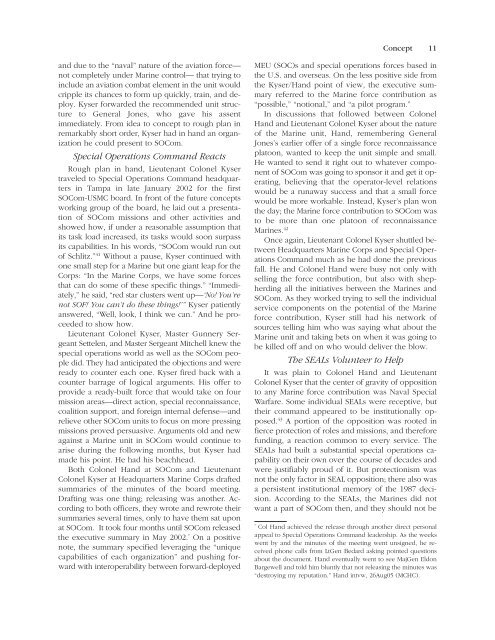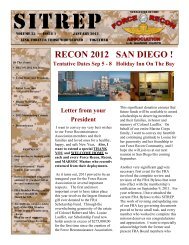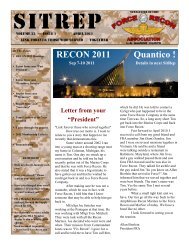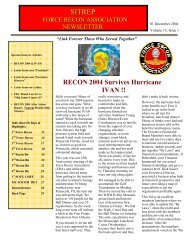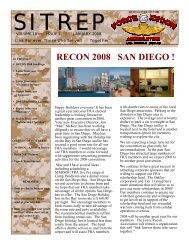Det One - Force Recon Association
Det One - Force Recon Association
Det One - Force Recon Association
Create successful ePaper yourself
Turn your PDF publications into a flip-book with our unique Google optimized e-Paper software.
Concept 11<br />
and due to the “naval” nature of the aviation force—<br />
not completely under Marine control— that trying to<br />
include an aviation combat element in the unit would<br />
cripple its chances to form up quickly, train, and deploy.<br />
Kyser forwarded the recommended unit structure<br />
to General Jones, who gave his assent<br />
immediately. From idea to concept to rough plan in<br />
remarkably short order, Kyser had in hand an organization<br />
he could present to SOCom.<br />
Special Operations Command Reacts<br />
Rough plan in hand, Lieutenant Colonel Kyser<br />
traveled to Special Operations Command headquarters<br />
in Tampa in late January 2002 for the first<br />
SOCom-USMC board. In front of the future concepts<br />
working group of the board, he laid out a presentation<br />
of SOCom missions and other activities and<br />
showed how, if under a reasonable assumption that<br />
its task load increased, its tasks would soon surpass<br />
its capabilities. In his words, “SOCom would run out<br />
of Schlitz.” 41 Without a pause, Kyser continued with<br />
one small step for a Marine but one giant leap for the<br />
Corps: “In the Marine Corps, we have some forces<br />
that can do some of these specific things.” “Immediately,”<br />
he said, “red star clusters went up—‘No! You’re<br />
not SOF! You can’t do these things!’” Kyser patiently<br />
answered, “Well, look, I think we can.” And he proceeded<br />
to show how.<br />
Lieutenant Colonel Kyser, Master Gunnery Sergeant<br />
Settelen, and Master Sergeant Mitchell knew the<br />
special operations world as well as the SOCom people<br />
did. They had anticipated the objections and were<br />
ready to counter each one. Kyser fired back with a<br />
counter barrage of logical arguments. His offer to<br />
provide a ready-built force that would take on four<br />
mission areas—direct action, special reconnaissance,<br />
coalition support, and foreign internal defense—and<br />
relieve other SOCom units to focus on more pressing<br />
missions proved persuasive. Arguments old and new<br />
against a Marine unit in SOCom would continue to<br />
arise during the following months, but Kyser had<br />
made his point. He had his beachhead.<br />
Both Colonel Hand at SOCom and Lieutenant<br />
Colonel Kyser at Headquarters Marine Corps drafted<br />
summaries of the minutes of the board meeting.<br />
Drafting was one thing; releasing was another. According<br />
to both officers, they wrote and rewrote their<br />
summaries several times, only to have them sat upon<br />
at SOCom. It took four months until SOCom released<br />
the executive summary in May 2002. * On a positive<br />
note, the summary specified leveraging the “unique<br />
capabilities of each organization” and pushing forward<br />
with interoperability between forward-deployed<br />
MEU (SOC)s and special operations forces based in<br />
the U.S. and overseas. On the less positive side from<br />
the Kyser/Hand point of view, the executive summary<br />
referred to the Marine force contribution as<br />
“possible,” “notional,” and “a pilot program.”<br />
In discussions that followed between Colonel<br />
Hand and Lieutenant Colonel Kyser about the nature<br />
of the Marine unit, Hand, remembering General<br />
Jones’s earlier offer of a single force reconnaissance<br />
platoon, wanted to keep the unit simple and small.<br />
He wanted to send it right out to whatever component<br />
of SOCom was going to sponsor it and get it operating,<br />
believing that the operator-level relations<br />
would be a runaway success and that a small force<br />
would be more workable. Instead, Kyser’s plan won<br />
the day; the Marine force contribution to SOCom was<br />
to be more than one platoon of reconnaissance<br />
Marines. 42<br />
Once again, Lieutenant Colonel Kyser shuttled between<br />
Headquarters Marine Corps and Special Operations<br />
Command much as he had done the previous<br />
fall. He and Colonel Hand were busy not only with<br />
selling the force contribution, but also with shepherding<br />
all the initiatives between the Marines and<br />
SOCom. As they worked trying to sell the individual<br />
service components on the potential of the Marine<br />
force contribution, Kyser still had his network of<br />
sources telling him who was saying what about the<br />
Marine unit and taking bets on when it was going to<br />
be killed off and on who would deliver the blow.<br />
The SEALs Volunteer to Help<br />
It was plain to Colonel Hand and Lieutenant<br />
Colonel Kyser that the center of gravity of opposition<br />
to any Marine force contribution was Naval Special<br />
Warfare. Some individual SEALs were receptive, but<br />
their command appeared to be institutionally opposed.<br />
43 A portion of the opposition was rooted in<br />
fierce protection of roles and missions, and therefore<br />
funding, a reaction common to every service. The<br />
SEALs had built a substantial special operations capability<br />
on their own over the course of decades and<br />
were justifiably proud of it. But protectionism was<br />
not the only factor in SEAL opposition; there also was<br />
a persistent institutional memory of the 1987 decision.<br />
According to the SEALs, the Marines did not<br />
want a part of SOCom then, and they should not be<br />
*<br />
Col Hand achieved the release through another direct personal<br />
appeal to Special Operations Command leadership. As the weeks<br />
went by and the minutes of the meeting went unsigned, he received<br />
phone calls from LtGen Bedard asking pointed questions<br />
about the document. Hand eventually went to see MajGen Eldon<br />
Bargewell and told him bluntly that not releasing the minutes was<br />
“destroying my reputation.” Hand intvw, 26Aug05 (MCHC).


